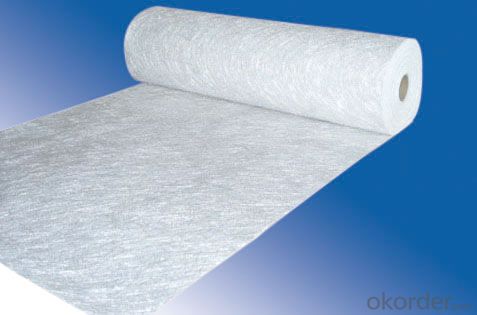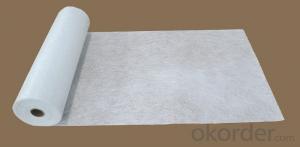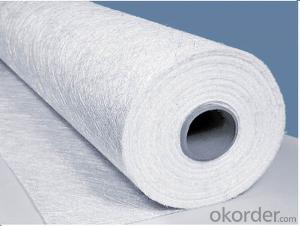E-glass Fiber Chopped Strand Mat(Powder Bonded)
- Loading Port:
- Shanghai
- Payment Terms:
- TT or LC
- Min Order Qty:
- 20000 kg
- Supply Capability:
- 200000 kg/month
OKorder Service Pledge
OKorder Financial Service
You Might Also Like
Brief Introduction
Chopped strand mat (or CSM as it is often known) is the most widely used of all composite reinforcement materials.
Short strands of glass are randomly scattered and bound to create a mat which can then be wetted out with resin and used as a general purpose reinforcement for traditional fibreglass (GRP/FRP) moulds or parts.
Product Features:
1. Fast Wet-out
2. Even thickness
3. High mechanical strength
4. Excellent wet strength retention

Product Specifications: Property Area Weight Moisture Content Size Content Breakage Strength Width (%) (%) (%) (N) (mm) Property IS03374 ISO3344 ISO1887 ISO3342 EMC80P ±7.5 ≤0.20 8-12 ≥40 50-3300 EMC100P ≥40 EMC120P ≥50 EMC150P 4-8 ≥50 EMC180P ≥60 EMC200P ≥60 EMC225P ≥60 EMC300P 3-4 ≥90 EMC450P ≥120 EMC600P ≥150 EMC900P ≥200
Special specification can be produce according to customer requirements.
Deliverytime
15-20days after received deposit.
Packaging
Plastic bag packing, 2 / 4 / 6 / 8 rolls in one carton box,then tray.
Other terms
We accept the CUSTOMIZATION. OEM is our strength.(spec, color, packing,etc)
- Q:What is the moisture vapor transmission rate of fiberglass mat tissue?
- The moisture vapor transmission rate of fiberglass mat tissue can vary depending on its specific composition and manufacturing process. It is typically low, as fiberglass is known for its moisture resistance properties.
- Q:How does fiberglass mat tissue compare to spray foam insulation?
- Fiberglass mat tissue and spray foam insulation are two different types of insulation materials with their own unique characteristics and benefits. Fiberglass mat tissue is a type of insulation made from woven strands of fiberglass. It is typically used in applications where thermal insulation is required, such as in walls, roofs, and attics. Fiberglass mat tissue is known for its high resistance to heat transfer, making it an effective insulator. It is also fire-resistant, which adds an additional safety benefit. On the other hand, spray foam insulation is a type of insulation that is applied as a liquid and expands into a solid foam. It can fill in small cracks and gaps, creating an airtight seal, which makes it an excellent choice for preventing air leakage and reducing energy loss. Spray foam insulation is also known for its excellent soundproofing qualities. In terms of installation, fiberglass mat tissue usually comes in large rolls or batts that need to be cut and fitted into place. It requires careful handling to ensure proper installation and may require the use of protective equipment, such as gloves and masks, as the fibers can cause skin and respiratory irritation. Spray foam insulation, on the other hand, is applied using specialized equipment that sprays the liquid foam onto the desired surface. It expands quickly, filling in any gaps or voids, and hardens within a short period of time. This makes it a more convenient option for insulating hard-to-reach areas or irregularly shaped spaces. When comparing the two, fiberglass mat tissue is generally more cost-effective, as it is less expensive to purchase and install compared to spray foam insulation. However, spray foam insulation provides better air sealing and can offer higher energy savings in the long run. In summary, fiberglass mat tissue and spray foam insulation have their own advantages and are suited for different insulation needs. Fiberglass mat tissue is a good option for thermal insulation, while spray foam insulation excels in air sealing and soundproofing. The choice between the two ultimately depends on factors such as budget, desired insulation performance, and the specific requirements of the project.
- Q:What are the different color options available for fiberglass mat tissue?
- Various color options are offered for fiberglass mat tissue, catering to different preferences and applications. White, gray, black, and beige are among the commonly available colors. These color choices offer versatility in design and aesthetics, allowing users to select a color that enhances their individual project needs. Factors like UV resistance and desired visibility or camouflage levels can also influence the color selection. In conclusion, the availability of diverse color options for fiberglass mat tissue grants users the flexibility and customization opportunities necessary to achieve their desired results.
- Q:What is the dimensional stability of fiberglass mat tissue?
- The ability of fiberglass mat tissue to maintain its size and shape under different conditions is referred to as its dimensional stability. Fiberglass mat tissue is well-known for its outstanding dimensional stability, which makes it highly resistant to shrinking, expanding, or warping. This stability is achieved through the manufacturing process, where glass fibers are bonded together using a binder material. Not only does this binder ensure the integrity of the mat tissue, but it also helps it maintain its dimensional stability over time. Moreover, the exceptional dimensional stability of fiberglass mat tissue is further enhanced by its inherent properties, such as its high strength and stiffness. These characteristics have made fiberglass mat tissue a popular choice in various industries, including construction, automotive, and aerospace, where maintaining consistent dimensions is essential for optimal performance and durability.
- Q:Is fiberglass mat tissue suitable for agricultural applications?
- Yes, fiberglass mat tissue is suitable for agricultural applications. It is a versatile material that offers several benefits for use in the agricultural industry. Fiberglass mat tissue is resistant to moisture, chemicals, and UV radiation, making it ideal for applications such as greenhouse roofing, animal enclosures, and agricultural equipment. It provides excellent insulation properties, helping to regulate temperature and protect crops or livestock from extreme weather conditions. Additionally, fiberglass mat tissue is lightweight, easy to install, and durable, making it a cost-effective choice for agricultural projects. Overall, fiberglass mat tissue is a suitable material for various agricultural applications, offering durability, versatility, and protection for the farming industry.
- Q:Can fiberglass mat tissue be used for insulation in chemical storage tanks?
- Indeed, insulation in chemical storage tanks can be achieved using fiberglass mat tissue. The exceptional insulation properties of fiberglass render it a fitting substance for tanks that house chemicals. Typically composed of finely interwoven glass fibers, the fiberglass mat tissue constitutes a robust and long-lasting material. Its application to the inner walls of the tank effectively insulates and thwarts heat transfer. Furthermore, fiberglass exhibits corrosion resistance and can endure the detrimental effects of the chemicals commonly stored within these tanks, making it an optimal option for insulation in chemical storage tanks.
- Q:What is the expected lifespan of fiberglass mat tissue in chemical storage applications?
- The expected lifespan of fiberglass mat tissue in chemical storage applications can vary depending on several factors. These factors include the type of chemicals being stored, the concentration of the chemicals, and the specific conditions of the storage environment. Fiberglass mat tissue is commonly used in chemical storage applications due to its excellent resistance to corrosion and its ability to provide structural reinforcement. However, it is important to note that fiberglass mat tissue is not completely impervious to chemical degradation. In general, fiberglass mat tissue can withstand a wide range of chemicals and can have a relatively long lifespan when properly maintained. It is typically designed to last for several years, with some manufacturers offering warranties ranging from 10 to 20 years. However, certain aggressive chemicals or extreme storage conditions may accelerate the degradation process of fiberglass mat tissue. Chemicals with high acidity or alkalinity, extreme temperatures, or prolonged exposure to UV radiation can potentially reduce the lifespan of the material. To ensure the maximum lifespan of fiberglass mat tissue in chemical storage applications, it is essential to carefully select the appropriate type of fiberglass mat tissue that is specifically designed for the intended chemicals and storage conditions. Regular inspections, maintenance, and proper handling of the chemicals can also help extend the lifespan of the material. Ultimately, it is recommended to consult with the manufacturer or a qualified engineer to determine the expected lifespan of fiberglass mat tissue in a specific chemical storage application, as they can provide more accurate information based on the specific circumstances.
- Q:How does the strength of fiberglass mat tissue compare to other reinforcement materials?
- The strength of fiberglass mat tissue is comparable, if not superior, to other reinforcement materials. It offers excellent tensile strength, high resistance to corrosion, and good thermal insulation properties. Additionally, it is lightweight, flexible, and cost-effective, making it a popular choice in various industries such as construction, automotive, and aerospace.
- Q:Is fiberglass mat tissue suitable for high-temperature applications?
- No, fiberglass mat tissue is not suitable for high-temperature applications.
- Q:Is fiberglass mat tissue suitable for automotive interiors?
- Automotive interiors can benefit from the use of fiberglass mat tissue. This versatile material is widely utilized in many industries, including automotive manufacturing. It possesses several advantages that make it appropriate for car interiors. To begin with, fiberglass mat tissue offers excellent insulation capabilities. It effectively reduces noise, vibration, and harshness (NVH) levels inside the vehicle cabin. This greatly enhances passenger comfort and the overall driving experience. Moreover, fiberglass mat tissue is lightweight and flexible, making it easy to install in different areas of the car's interior. It can be molded and shaped to fit various components like door panels, headliners, trunk liners, and floor carpets. Its flexibility also allows for seamless integration with other materials, such as sound-deadening substances, to further improve insulation and minimize vibrations. Additionally, fiberglass mat tissue exhibits resistance to heat, moisture, and chemicals commonly found in automotive environments. This renders it a durable and long-lasting material capable of withstanding the unique conditions inside a vehicle. It also resists the growth of mold and mildew, ensuring a clean and hygienic interior. Furthermore, fiberglass mat tissue can be easily coated or laminated with other materials to enhance its aesthetic appeal. It can be finished with various fabrics, vinyl, or leather to match the desired interior design and provide a luxurious feel. In conclusion, fiberglass mat tissue is a suitable material for automotive interiors due to its insulation properties, lightweight and flexible nature, durability, resistance to heat and moisture, and potential for aesthetic enhancements. Its utilization contributes to the creation of a comfortable, quiet, and visually pleasing cabin space for vehicle occupants.
1. Manufacturer Overview |
|
|---|---|
| Location | |
| Year Established | |
| Annual Output Value | |
| Main Markets | |
| Company Certifications | |
2. Manufacturer Certificates |
|
|---|---|
| a) Certification Name | |
| Range | |
| Reference | |
| Validity Period | |
3. Manufacturer Capability |
|
|---|---|
| a)Trade Capacity | |
| Nearest Port | |
| Export Percentage | |
| No.of Employees in Trade Department | |
| Language Spoken: | |
| b)Factory Information | |
| Factory Size: | |
| No. of Production Lines | |
| Contract Manufacturing | |
| Product Price Range | |
Send your message to us
E-glass Fiber Chopped Strand Mat(Powder Bonded)
- Loading Port:
- Shanghai
- Payment Terms:
- TT or LC
- Min Order Qty:
- 20000 kg
- Supply Capability:
- 200000 kg/month
OKorder Service Pledge
OKorder Financial Service
Similar products
New products
Hot products
Related keywords



























